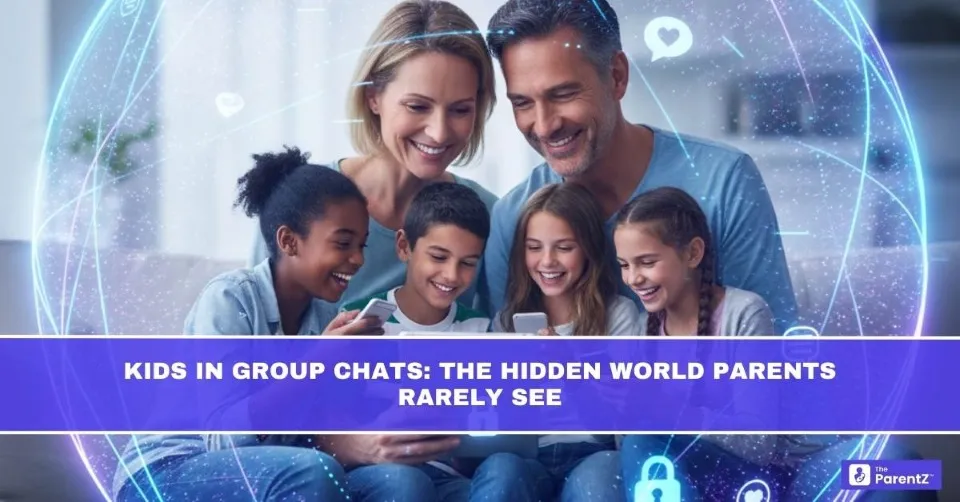Your 13-year-old comes home from school, grabs a snack, and immediately disappears into their room with their phone. You hear occasional giggles, typing sounds, and sometimes complete silence. When you ask what they're doing, you get the standard "just texting friends" response. But here's what most parents don't realize: your child isn't just texting their school friends anymore. They're likely part of multiple group chats with people they've never met in real life.
Welcome to the world of random group chats, a digital phenomenon that's completely transforming how kids connect online, and it's happening right under our noses.
What Are Random Group Chats?
Think of random group chats as digital hangout spots where kids from different schools, cities, or even countries come together to talk. These groups form on platforms like Discord, Snapchat, Instagram, WhatsApp, and even gaming platforms. Unlike traditional group chats with classmates, these groups often start when someone posts "add me to group chats" on their social media story, or when they join through shared interests like gaming, music, or fandoms.
Kids discover these groups through hashtags, friend recommendations, or by being added by someone they barely know. A typical scenario: your daughter follows an Insta creator, comments on their post, and suddenly gets added to three different group chats with fans from across the globe.
Why Kids Are Drawn to These Spaces
For today's generation, random group chats offer something school friendships sometimes can't: complete freedom to be themselves without the social pressure of face-to-face interactions. Here's why kids find them irresistible:
- Escape from real-world drama: School can be overwhelming. Online groups feel like a fresh start where past mistakes or social hierarchies don't follow them.
- Finding their tribe: A kid passionate about anime or indie music might not find others who share their interests at school, but online groups connect them with like-minded peers instantly.
- 24/7 social connection: These chats never sleep. When your child can't sleep at 2 AM, someone in their group chat in a different time zone is awake and ready to talk.
- Identity exploration: Online spaces let kids experiment with different versions of themselves by trying out new humor, interests, or even personas without immediate consequences.
The Hidden Risks Parents Need to Know
While these digital friendships can provide genuine support and connection, they also create risks that many parents haven't considered:
- Predators posing as teens.: Adults with harmful intentions often infiltrate teen group chats by creating fake profiles. They spend weeks building trust, learning teen language and trends, before attempting to move conversations to private messages or real-life meetings.
- Pressure to share personal information: Group dynamics can pressure kids to prove they're "real" by sharing photos, school names, or location details. What starts as innocent bonding can quickly become oversharing.
- Cyberbullying and exclusion: Random group chats can turn toxic fast. Kids might face harassment, be kicked out without explanation, or become targets of coordinated bullying from multiple strangers.
- Inappropriate content exposure: These groups often lack moderation. Kids might encounter graphic images, explicit conversations, or links to harmful content that parents would never allow in their home.
- Sleep disruption and addiction: The constant activity in multiple time zones means notifications never stop. Kids develop FOMO (fear of missing out) and stay awake responding to chats, affecting their sleep and school performance.
- Scams and manipulation: Teens in these groups might be targeted for gift card scams, asked to download malicious apps, or manipulated into participating in challenges that could harm them.
How to Address This Reality
Instead of banning group chats entirely (which often doesn't work), try these approaches:
- Start conversations, not investigations: Ask about their online friendships with genuine curiosity. "Tell me about your group chats – what do you guys talk about?" works better than "Who are these people you're texting?"
- Establish phone-free times: Create natural breaks from the constant connectivity – during family meals, homework time, and an hour before bed.
- Review privacy settings together: Show them how to control who can add them to groups and how to leave chats that make them uncomfortable.
- Discuss red flags: Help them recognize when conversations turn inappropriate, when someone asks to move to a different platform, or when they feel pressured to share personal information.
- Keep devices in common areas at night: This simple boundary helps ensure better sleep and reduces late-night risky conversations.
Conclusion
The digital world your kids live in is completely different from your childhood friendships, but their need for connection and belonging remains the same. By understanding their online social world without judgment, you can help them handle it safely while maintaining the trust and communication that keeps families strong.
Remember: the goal isn't to eliminate their digital social life, but to help them build the skills to live in it safely.





Be the first one to comment on this story.